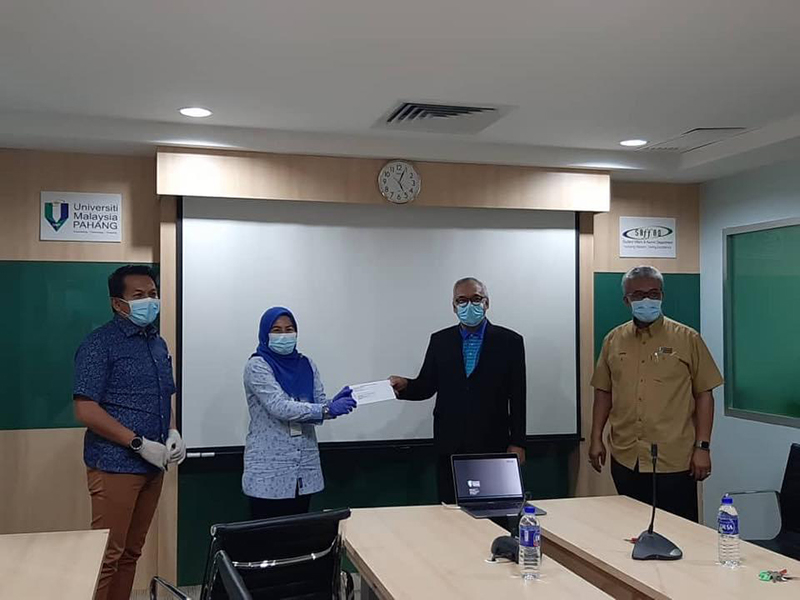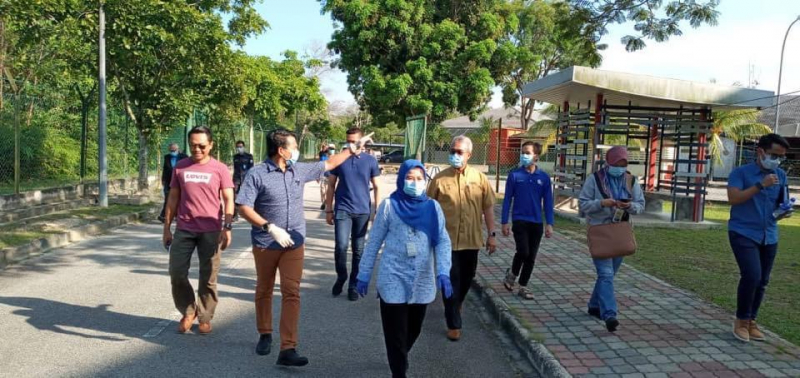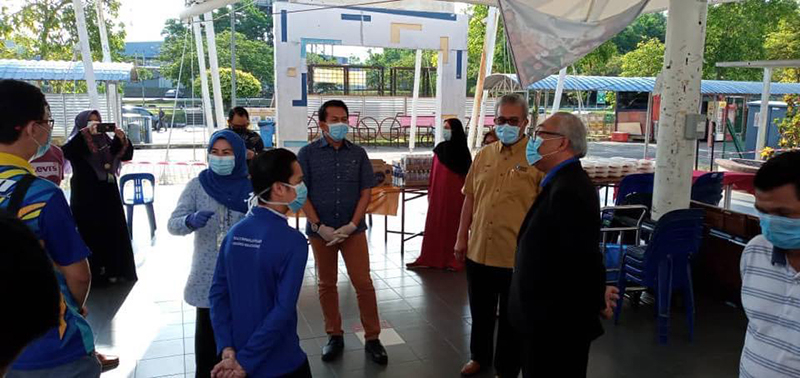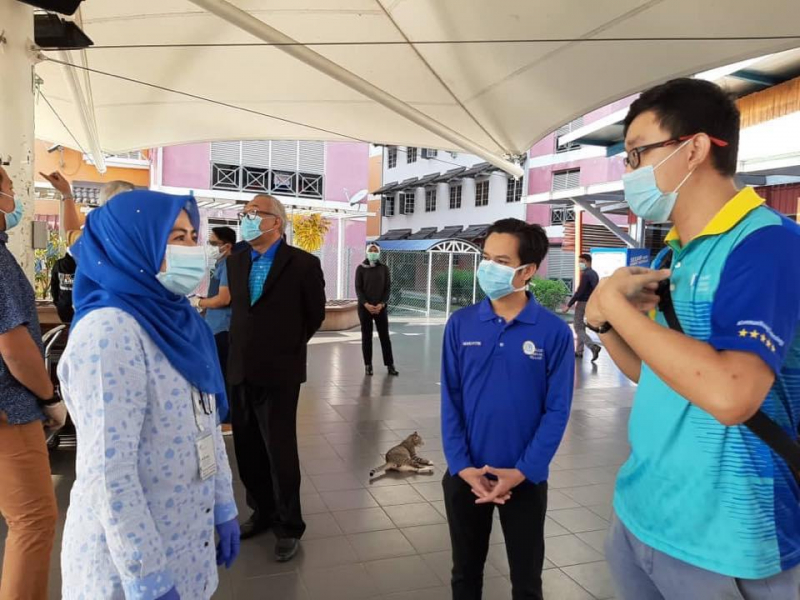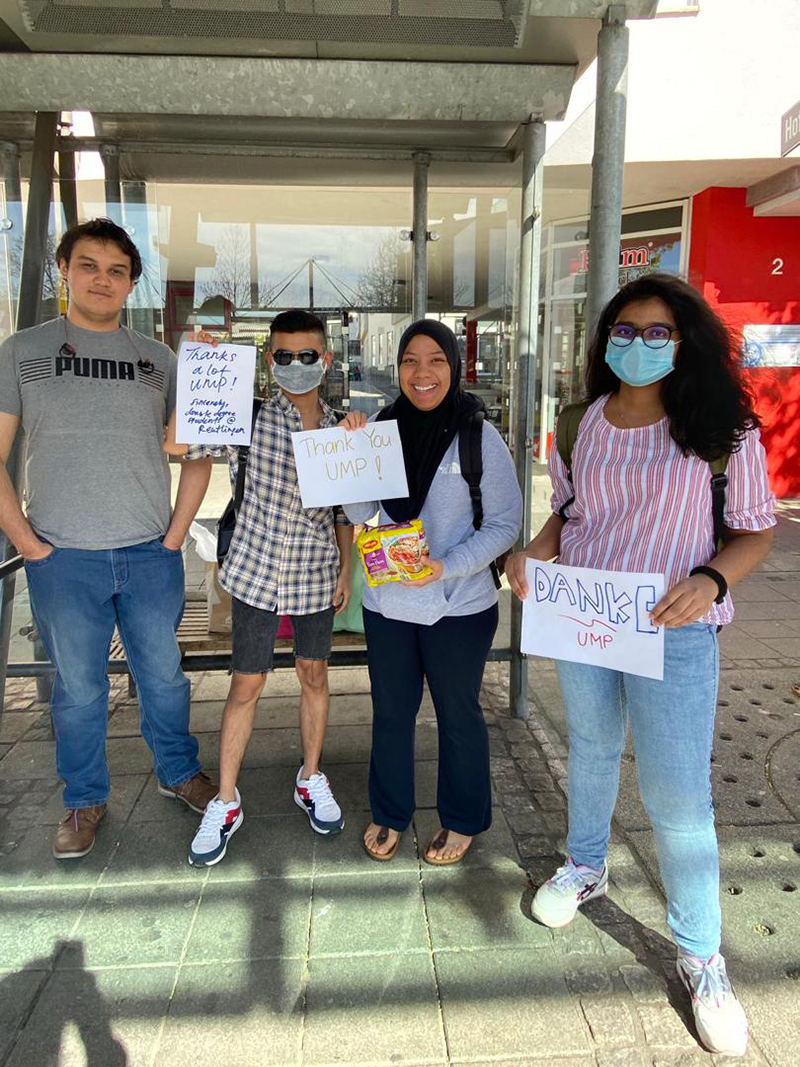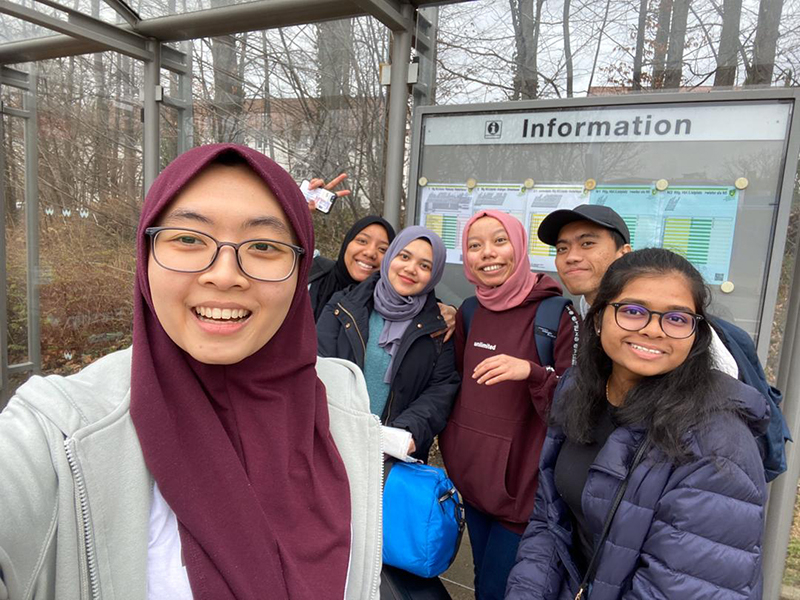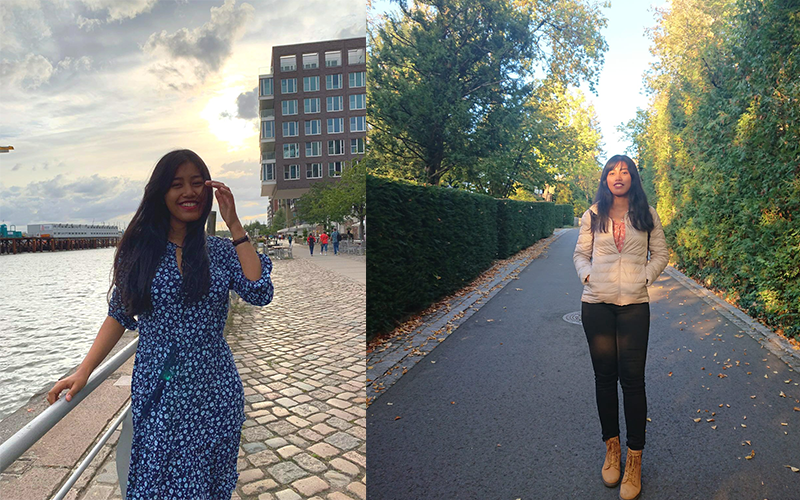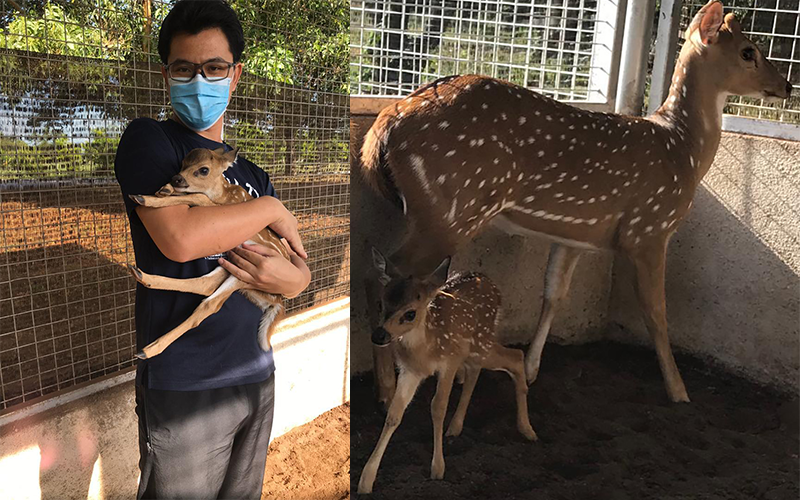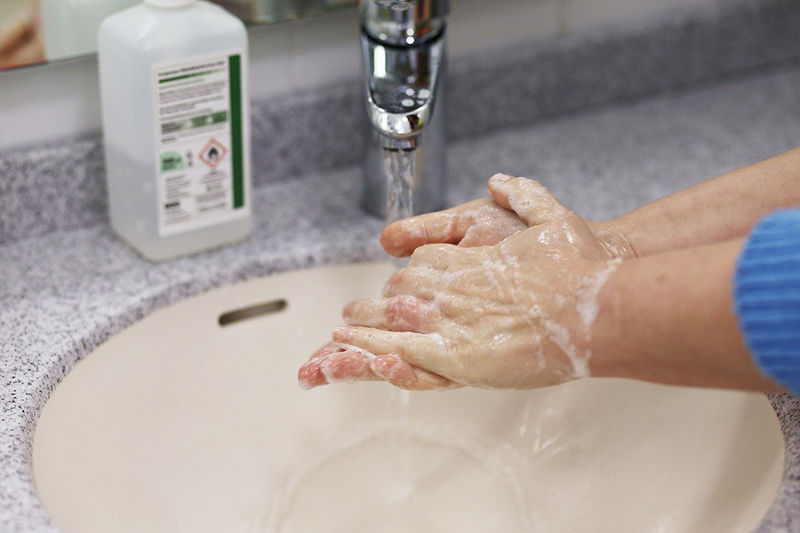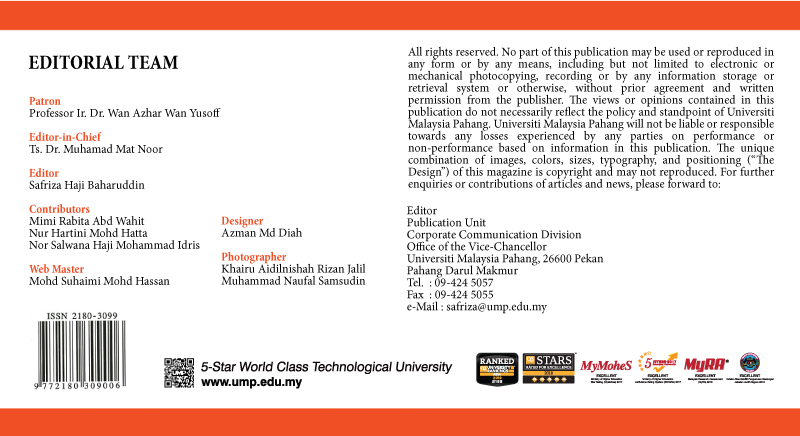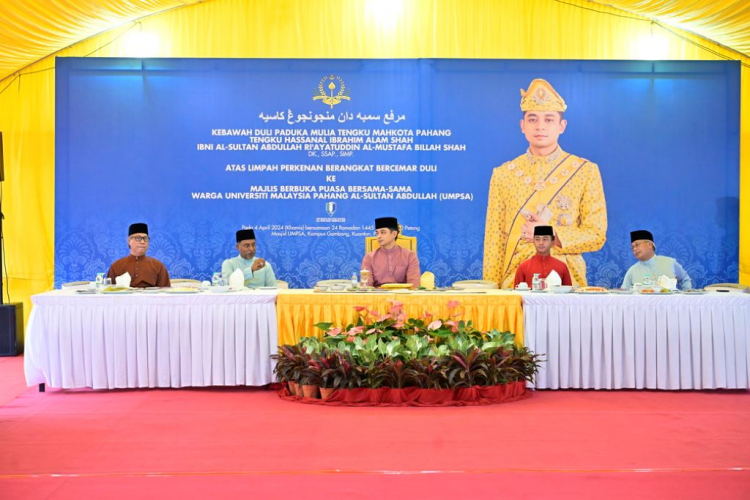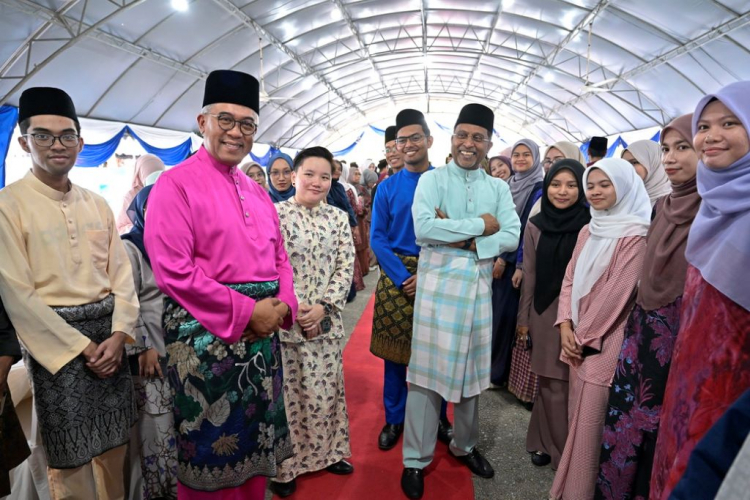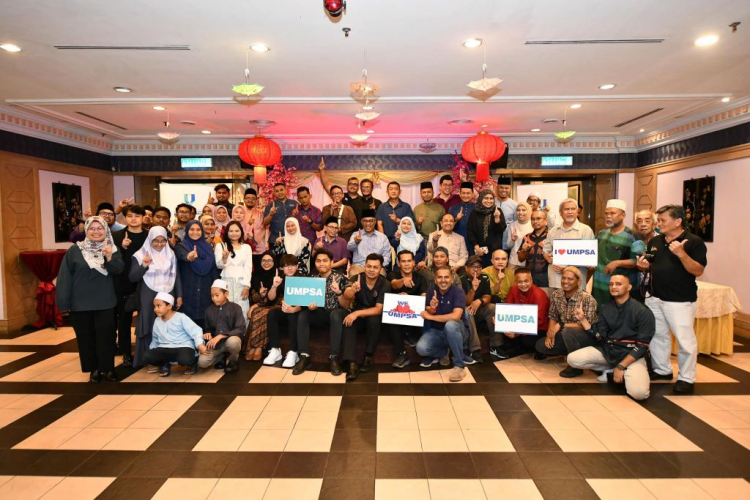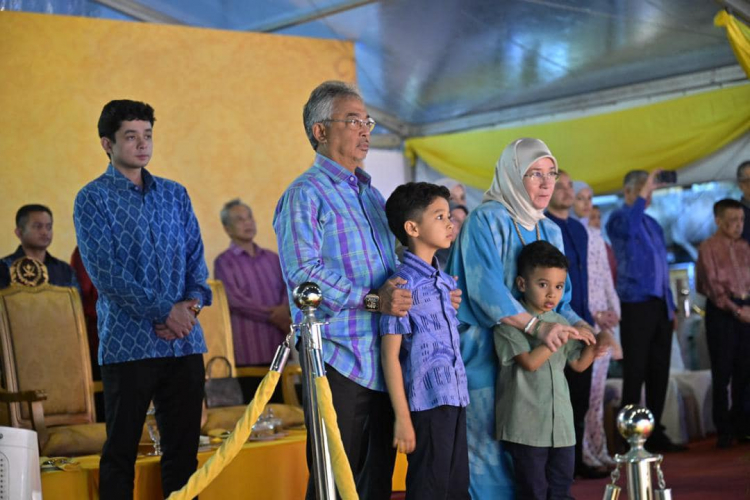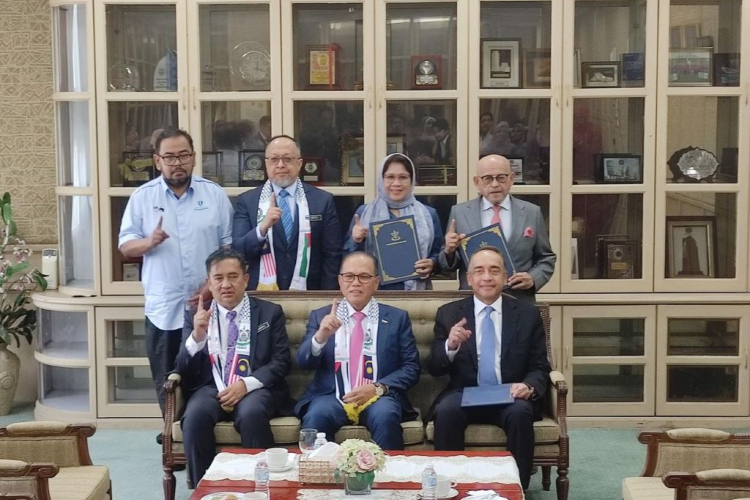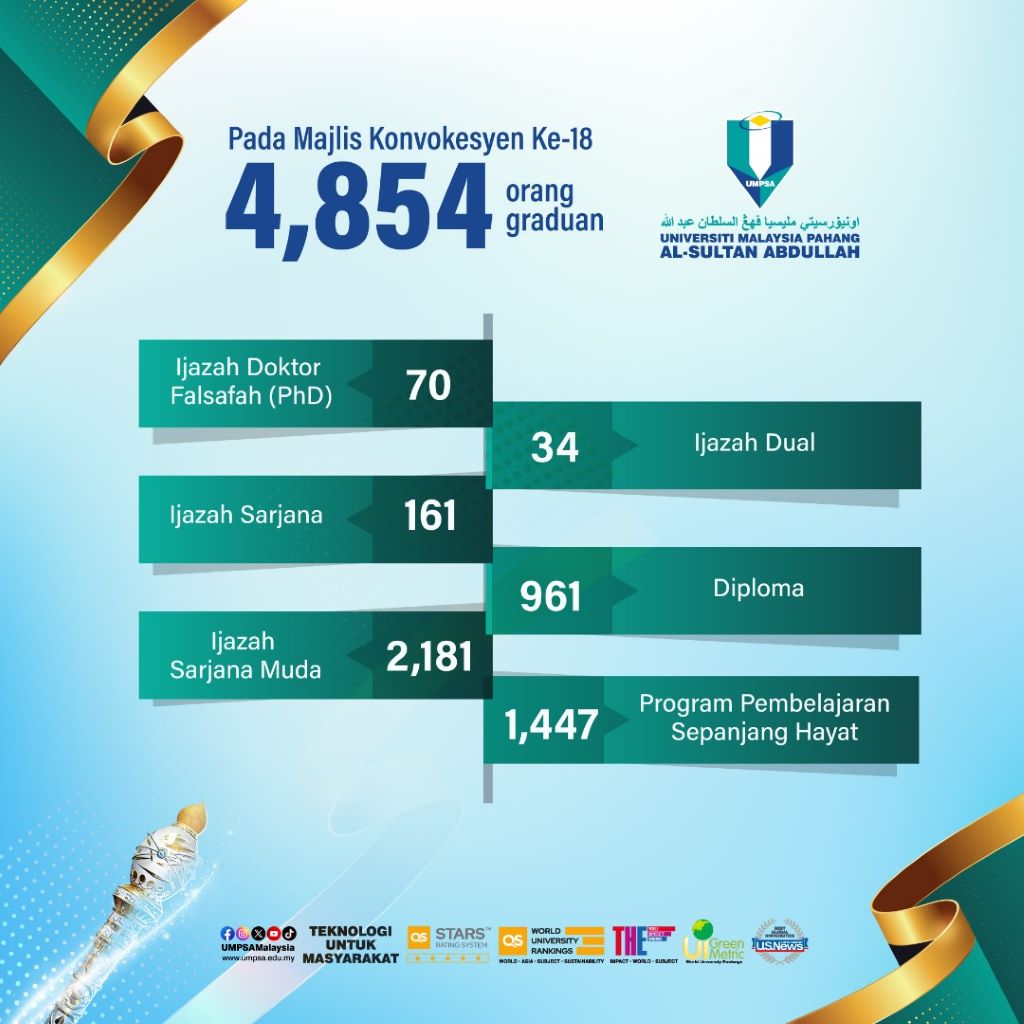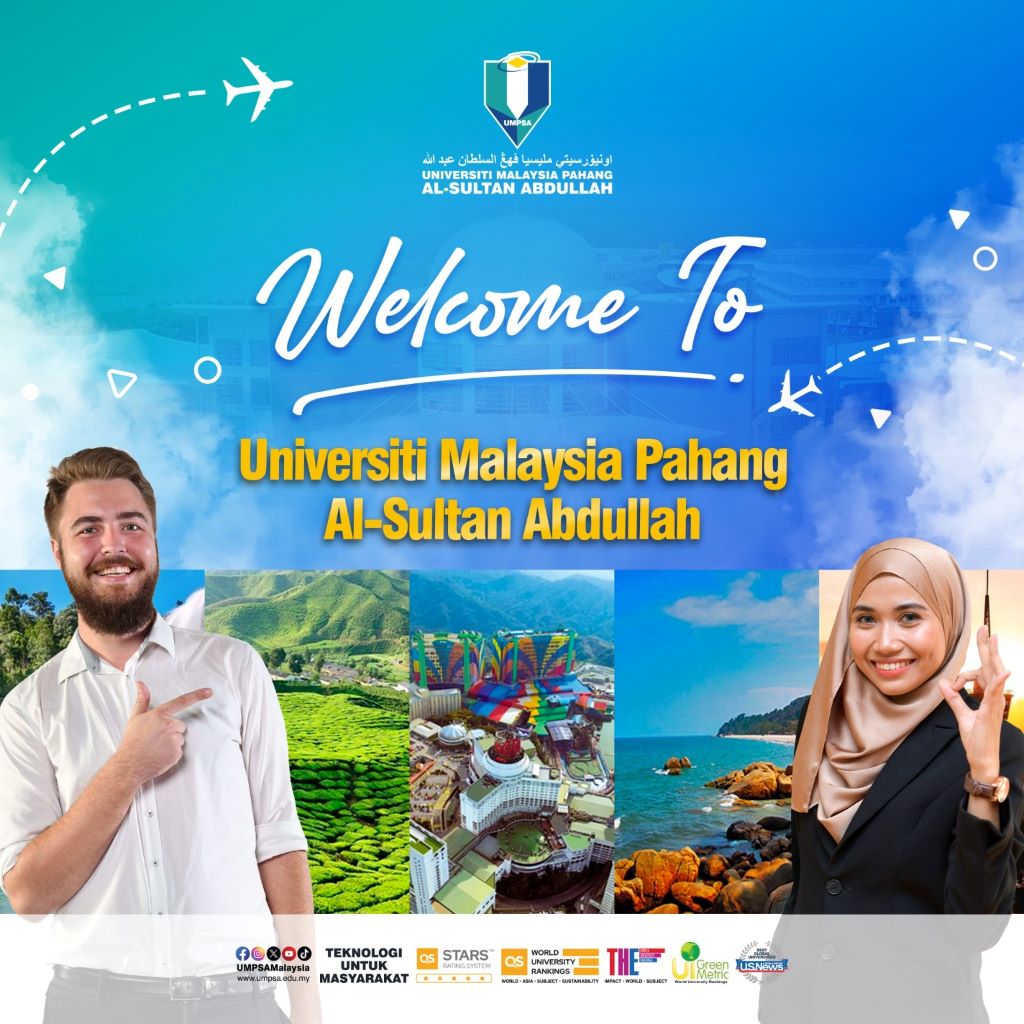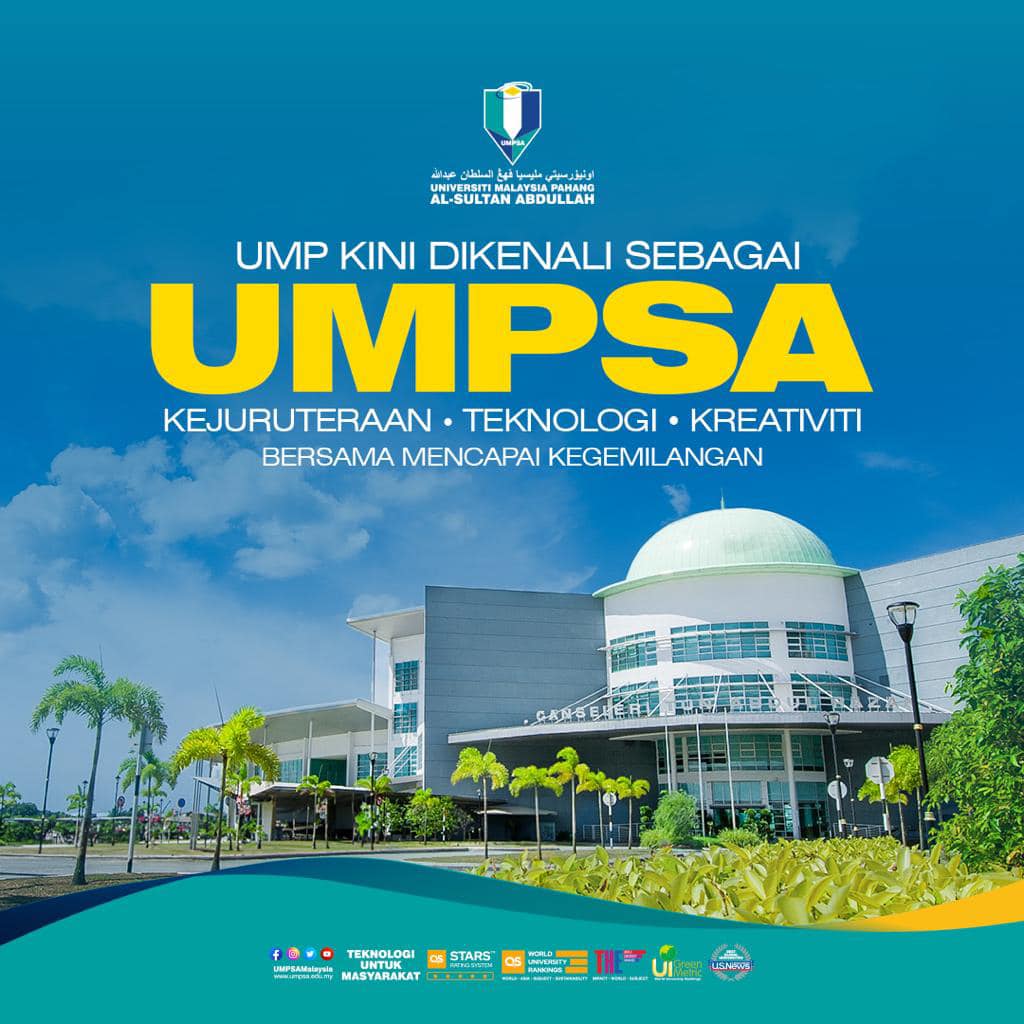 Around Campus Info Higher Education Minister surveys UMP readiness in handling Covid-19 outbreak
By: MOHD. FERDAUS MUSA, OFFICE OF THE VICE-CHANCELLOR The Higher Education Minister, Dato’ Dr. Noraini Ahmad visited Universiti Malaysia Pahang (UMP) on 10 April 2020 to survey the readiness of the university to face the Covid-19 outbreak. Joining the visit was the Finance Deputy Minister II, Mohd Shahar Abdullah, who is also the Paya Besar Member of Parliament. The arrival of Dato’ Dr. Noraini was greeted by the UMP Vice-Chancellor, Professor Ir. Dr. Wan Azhar Wan Yusof, along with the Deputy Vice-Chancellor (Student Affairs and Alumni), Professor Dato’ Dr. Yuserrie Zainuddin and the President of the Students’ Representative Council (MPP), Mohd Fitri Zulkafli in UMP Gambang Campus.
During the visit, the delegates were briefed about the current situation in the university in handling the Covid-19 outbreak and the internal compliance to the Movement Control Order (MCO). She also contributed face masks and donated RM3,000.00 from the Ministry of Higher Education. According to Professor Ir. Dr. Wan Azhar, UMP was grateful with the visit by Dato’ Dr. Noraini during the MCO period. “We welcome the efforts of the government and the Ministry of Higher Education (MOHE) in helping the university, especially in bearing the cost of food preparation for the students on campus. “UMP always prioritises the safety and welfare of our 1,260 students. “This includes food preparation, health facilities and daily necessities, involving the off-campus students. “UMP also appreciates the contribution from the community in ensuring an adequate supply of food and daily necessities,” he said. Besides, UMP Campus Pantry, handled by Student Affairs and Alumni Department, managed to collect daily necessities and dry food from Food Bank Malaysia under the Ministry of Domestic Trade and Consumer Affairs (KPDNHEP). Dato’ Dr. Noraini also visited the Residential Colleges and had the opportunity to observe the systematic management of food distribution for the students, following the necessary safety procedures.
Students need to scan the code provided for data recording, clean hands using the hand sanitizer and maintain the social distance. Dato’ Dr. Noraini asked the students to be patient and stay on campus as recommended by the Ministry of Health (MOH) and National Security Council (NSC), as the mass movement to return to their hometowns may spark new Covid-19 clusters. “The government has encouraged students to remain in their respective locations until further instructions,” she said.
She believes the students understand that we are in a difficult situation in fighting this global threat. The government also appreciates the sacrifice shown by students in combating the outbreak. She also hopes the students remain patient and stay on campus to break the Covid-19 chain. Dato’ Dr. Noraini also praised and thanked the UMP frontliners in ensuring the welfare of students on campus without compromising safety and health during the MCO period. Academic and International “We are fine, don’t worry” - UMP students in Germany
Translation by: DR. ROZAIMI ABU SAMAH, FACULTY OF CHEMICAL AND PROCESS ENGINEERING TECHNOLOGY A Business Engineering student from Universiti Malaysia Pahang (UMP), Batrisyia Elena Roslan, 22, who is continuing her study in Germany since 10 September last year, along with 11 other students, is now in a safe condition. She asked her family and friends in Malaysia not to worry because the situation in her area is still under control. Germany is among the five countries with the highest reported cases of Covid-19. After two years of studying at UMP, Elena is currently in Hochschule Reutlingen University for two years and is expected to return to Malaysia in December next year.
Along with her are Abdufotikh Akhmedov, Syukri Aiman Abdul Rahman dan Darshinii Manikam. According to Elena, the lectures are done online. “We are using online platforms such as Zoom, Microsoft Teams and Webex “The implementation of face-to-face lectures is still in discussion between the university and the state government of Baden-Württemberg,” she said. She also said that during the beginning of the pandemic, she faced difficulties with buying bread. “However, the basic necessities are still accessible. There is no lockdown here, but they are encouraged to stay at home. “Most shops are still closed, and restaurants are only allowed for takeaway. “The welfare of students is also looked after by the two universities. They always communicate with us here,” she said. They also received face masks and food from UMP such as sardines and biscuits. Currently, she and her friends take the advantage to learn German to prepare for the TestDaF exam this year and exercise individually in their rooms. Elena also advised all students in Malaysia and in other countries to be patient with the spread of Covid-19 that hit many countries. “Busy yourself with beneficial things and hone your talents,” she said. She is a positive person, and she sees this situation as an opportunity for self-improvement, and she prayed that all will be eased and this difficult situation ends soon. She also shared her first experience of fasting for 17 hours.
Meanwhile, a KL-hailed UMP alumnus, Syakiela Ahmad, 24, has lived in Germany for more than three years. She had finished her UMP-Reutlingen University dual degree programme and currently enrolled in a pre-master programme in Robert Bosch GmBH, Stuttgart. She must work for a year to gain industrial experience before pursuing her master’s study. “However, travelling is prohibited, and only a one-day trip without staying in the hotel is allowed. “Shops are open, and there is no problem in getting basic supplies, but no mall opened. “Besides, the German national borders are still closed to exit the country. She is relieved when the pre-master programme is not affected by the regulation,” she said while sharing her working experience in Germany. Due to the spread of Covid-19, all employees are forced to practise Home Office (work from home) which is likely to be extended until May compared to only several companies that implement Home Office every Friday previously. To pass her time, Syakiela can still bike around the lake and garden and do indoor gardening, as well as go for recreational activities in the mountains. Coming into Ramadan, she does a lot of cooking at home such as rendang, curry and tom yum, as most of the raw ingredients are available, except for fish because only salmon is available here. Sharing her experience, the Germans also provide free food for the homeless. It is also easy for them to get medical treatment because of the appointment system, and not many people are seen in any clinic at any given time. Germany recently took its first steps back towards normality by reopening small shops in several states after a one-month lockdown when the country has declared the Covid-19 ‘under control’. However, public gathering and social distancing guidelines remain in effect. Around Campus Info UMP's deer conceived the second fawn
Translation by: AMINATUL NOR MOHAMED SAID, FACULTY OF COMPUTING The deer, known as Pekan and Chini, raised in Mini Deer Park on the campus of Universiti Malaysia Pahang (UMP) in Pekan conceived their second fawn on April 22, 2020, at 7.00 am weighing 7kg after the birth of their first fawn in June last year. Three years ago, UMP received a pair of Spotted Deer or scientifically known as Axis Axis from the East Coast Economic Region (ECER) to make the university an educational tourism hub (Edu-Tour). This project is one of the 30 components of the Pekan-Kuala Pahang Town-Servicing Strategy. According to the Head of UMP Campus Sustainability and Greening Unit, Center for Property Development and Management (PPPH), Ts. Mohd Nurulakla Mohd Azlan, the presence pair of deer is a popular attraction as it is located near the UMP and Kuala Pahang entrance. “Deers are domesticated animals that are easy to breed and deer breeding is not a difficult task because they do not need to be well cared for. “We only feed this deer three times a day. Their main food is the nutrient-rich palette to ensure its health. "Apart from that, the deer are fed from UMP's plant sources such as Acacia leaf and Napier grass," he said. Typically, it requires about 10 to 15kg of Acacia leaves and Napier grass. Furthermore, there are over 2000 Acacia trees around UMP Pekan and at the same time, Napier grass is also planted in UMP. Meanwhile, the deer cage is cleaned once a week to ensure the deer's comfort in the enclosure. The university is planning to expand the area as well as improve the existing deer cage. They receive cooperation from the Pahang Veterinary Services Department led by Dr. Khairul Anuar Muhamad, who is the Veterinary Officer of Veterinary Health Division who monitors the deer and the fawn is in good health. UMP has always maintained a balance in technology to ensure the life of flora and fauna to make the university a sustainable campus. Research and Innovation Practise personal care and hygiene
By: TS DR. NORASHIKIN MAT ZAIN, FACULTY OF CHEMICAL AND PROCESS ENGINEERING TECHNOLOGY We are encouraged to always practise self-care and hygiene in everyday life, as many of the surfaces we touch are exposed to bacteria or viruses that can cause diseases. Bacteria or viruses can be transferred through handshaking, doorknobs, pipes, utensils, toilet tools and many more. Hands can act as the transfer agent when touching the face, especially eyes, nose or mouth. Hand washing is a crucial step to prevent the spread of disease. Washing your hands using soap should be practised daily, not only to prevent the spread of Covid-19. A lecturer from the Faculty of Chemical and Process Engineering Technology, Universiti Malaysia Pahang (UMP), Ts. Dr. Norashikin Mohd Zain said handwashing must be practised among all ages. “Children are particularly vulnerable to infectious diseases because they are less cautious when rubbing their eyes or nose after touching things or somebody else. “They should be educated about the importance of washing hands in the right way, especially before eating and after using the toilets. “As parents, we also need to have a sense of awareness in washing hands and to educate the children. “The practice of right handwashing must also be implemented in child care centres,” she said. She added that preschool children are vulnerable to diseases that are easily spread while they mingle. “It should also be implemented in schools to keep the students healthy. Similarly, mothers with infants are encouraged to wash their hands after changing diapers. “Our hands may seem clean, but it does not mean they are free from harmful microorganisms. “Everyone knows that it is vital to keep our hands clean in preventing the spread of infectious diseases. “However, to what extent do we practise the right handwashing step? Washing hands using soap and water is the best way to get rid of dirt, bacteria or viruses on the skin surface. “Clean hands prevent the spread of microorganisms between individuals,” she said. She noted that many cleaning or wash products in the market and we should know that each product has different contents and functions, depending on the suitability of the user’s skin. With more than 10 years of research experience in UMP, she shared her success in formulating three cleaning products, which are antibacterial hand wash, body wash and spray under the brand of Aureiz, Medieva Sdn. Bhd., funded by the Bumiputera Entrepreneurs Startup Scheme (SUPERB), under the Bumiputera Agenda Steering Unit (TERAJU). The hand wash is produced using safe antimicrobial substances, and it can clean hands from dirt, bacteria or viruses that cause diseases. “It uses a gentle formulation that cleanses the skin without drying it. This hand wash is available in a variety of soothing fragrances such as lavender and vanilla. “There is a difference in these body’s cleanser products compared to other products: these products do not contain sodium lauryl sulfate (SLS), sodium laureth sulfate (SLES), parabens or alcohol. “Natural surfactant is used to produce foam. It is safe for users, and the materials used are also environmentally friendly. The antimicrobial compounds in the products help to kill germs,” she said. To help kill bacteria on the surface and ambience, the company produces antimicrobial spray. It blends several antimicrobial materials to kill germs. The product contains natural extracts to replace the use of chemicals and provide a fragrant smell. This antimicrobial spray can also be used in living rooms, bedrooms, mattresses, toilets, toys, garbage areas, car interior or any surface for cleaning purposes. The spray comes in two refreshing scent options which are lavender and vanilla. These three products have been approved by the Ministry of Health (MOH) through Pharmaceutical Bureau and also passed the Recognition Programme for Lab Tested from Bioeconomy Corporation agency, to verify that the contents are safe. For self-hygiene, follow the 7-step hand washing method issued by the Ministry of Health (MOH); use sufficient soap and clean water, scrub your palms, scrub each and every fingers and area between them, scrub your nail on your palm and the back of your hands. Then, rinse your hands with sufficient clean water thoroughly and dry your hand with a clean towel or hairdryer. |
Sinar Harian
Bacaan surah al-Jumu'ah bergema di padang MBK1


